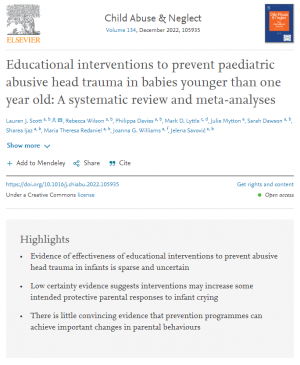Review reveals lack of evidence for effectiveness of educating parents to avoid ‘shaken baby’ abusive head trauma
27 October 2022
Evidence that educating parents is effective in avoiding abusive head trauma (also known as ‘shaken baby syndrome’) is lacking, an ARC West systematic review and meta-analysis has revealed. The paper, published in Child Abuse and Neglect, included 25 studies in the systematic review, with 16 included in the meta-analysis.
While it is not always possible to stop a baby crying it is, in theory, possible to modify the parent’s response to it. This makes parental education interventions a popular public health response to abusive head trauma.
However, the systematic review and meta-analysis has shown that there is very little evidence that educational programmes are effective at reducing abusive head trauma. There was also only a small amount of evidence that they improve some parental responses to infant crying.
Abusive head trauma, sometimes called ‘shaken baby syndrome’, is an injury inflicted on young children, usually caused by a blow to the head or violent shaking. Most victims are younger than six months old, and the person causing the injury is usually a parent or carer, most often a father or partner of the mother.
This form of abuse affects around 21-35 in 100,000 babies and is preventable. It can lead to learning, visual and hearing disabilities in up to 80% of victims, and 18-25% of babies with these injuries die.
In most studies the researchers reviewed, the intervention aimed to educate parents on the characteristics of crying in babies, and to let parents and care givers know that what they are experiencing is normal and will eventually pass.
No randomised controlled trials measured the number of babies with abusive head trauma as an outcome. From five non-randomised studies which did assess this, they found no evidence of a difference in the number of cases of abusive head trauma between the intervention groups and the control groups. There was some weak evidence from one cluster randomised control trial and one cohort study that the parents in the intervention groups were less likely to self-report violently shaking their babies.
Lauren Scott, Senior Research Associate at ARC West and lead author of the paper, said:
“Caring for an inconsolable baby is one of the most stressful experiences a new parent can face. There are many educational programmes out there aimed at helping parents cope with this incredibly common issue. The idea behind them is to give parents the tools to rationalise and understand their baby’s crying and know when to step away to avoid the situation escalating.
“But our systematic review and meta-analysis has shown that more robust evidence on the role of educating parents to prevent abusive head trauma is needed. At ARC West, we are investigating one such intervention, ICON. We look forward to adding to the evidence base.”
Paper
